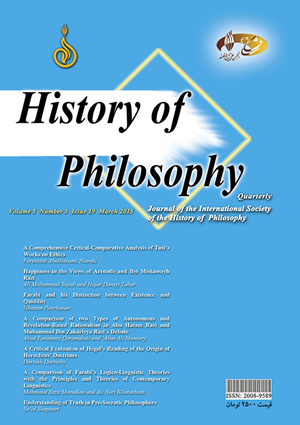Farabi and his Distinction between Existence and Quiddity
Subject Areas : ریشهشناسی واژگان (اتیمولوژی) فلسفی
1 - علامه طباطبائي
Keywords: Farabi meaning of being theory of distinction Greek tradition ontological and philosophical consequences ,
Abstract :
One of the innovations of Farabi and Islamic philosophy is the theory of the distinction between existence and quiddity. This view was merely developed in the light of understanding the meaning of the reality of being. Islamic philosophers, particularly Farabi and Ibn Sina, because of their epistemological rupture with Greek tradition, sought to understand being differently from Aristotle and, in a way, abstained from reducing the question of being to the question of the whatness of objects. In addition to a conceptual and logical distinction, Farabi managed to develop and present an ontological distinction in the field of philosophy. Ibn Sina expanded it so vastly that some might consider this theory as one of his own philosophical achievements. After the problem of the evidence and principliality of existence, the quality of the relationship between existence and quiddity turned out to be one of the most important discussions in Islamic philosophy. At the beginning, under the influence of dividing being into necessary and possible types, Muslim philosophers tried to explain the fundamental difference between them through explaining the relationship between quiddity and existence. As a result, they considered two propositions as the basis of two interpretations of existence and the explanation of its relationship with quiddity. The theory of the synthetic nature of quiddative existents in terms of their existence and quiddity, the existence’s being superadded or accidental to quiddity, and the distinction between existence and quiddity in existents are the views that emerged in Islamic philosophy with Farabi and gradually came to the fore as the most important discussions concerning existence. Furthermore, Farabi’s discussion concerning the individuation of quiddities and the criterion for individuation, which was later accepted by all Islamic philosophers and emphasized by them, was developed under the influence of the above theories. In this paper, the writer has initially tried to provide a correct understanding of the theory of distinction through clarifying its fundamental bases. Then he has clarified its ontological and philosophical consequences and highlighted the importance of this theory in Islamic philosophy. Such an explanation necessitates an extensive investigation of Farabi’s ideas about existence, the meaning of existence, and the existence-quiddity relation.
ابنسينا، الاشارات و التنبيهات، ترجمه حسن ملکشاهي، تهران، انتشارات سروش، 1367. #
ارسطو، متافيزيک، ترجمه شرفالدين خراساني، تهران، انتشارات حکمت، چ5، 1389. #
ايلخاني، محمد، متافيزيک بوئتيوس، نشر الهام،1380. #
ادواردز، پل، تاريخ مابعدالطبيعه، ترجمه شهرام پازوکي، تهران، پژوهشگاه علوم انساني، 1379. #
طباطبايي، محمدحسين، نهاية الحکمه، قم، مؤسسه النشر الاسلامي، 1404.ق #
فارابي، رسائل فلسفي، ترجمه سعيد رحيميان، تهران، انتشارات علمي و فرهنگي، چ1، 1387. #
فارابي، الدعاوي القلبيه، طبع حيدرآباد، هند، 1346.ق. #
فارابي، الحروف، تصحيح محسن مهدي، بيروت، دارالمشرق، 1990.م. #
فارابي، التعليقات، مقدمه، تحقيق و تصحيح سيدحسين موسويان، تهران، مؤسسه پژوهشي حکمت و فلسفه ايران، 1392. #
فارابي، فصوص الحکمة، انجمن آثار و مفاخر فرهنگي، 1381. #
فارابي، فصوص الحکمة، شرح اسماعيل شنب غازاني، تصحيح و تحقيق علي اوجبي، تهران، انتشارات حکمت، 1389. #
کاپلستون، فردريك، تاريخ فلسفه، فلسفه قرون وسطا، ترجمه ابراهيم دادجو، تهران، انتشارات علمي و فرهنگي، ج2، 1387. #
مصباح، محمدتقي، آموزش فلسفه، سازمان تبليغات اسلامي، 1366. #
ملاصدرا، المشاعر، تهران، انتشارات بنياد حکمت اسلامي صدرا، چ1، 1381. #
ملاصدرا، الشواهد الربوبيه، تصحيح، تحقيق و مقدمه سيدمصطفي محققداماد؛ باشراف استاد سيدمحمد خامنهاي، تهران، انتشارات بنياد حکمت اسلامي صدرا، چ2، 1391. #
ملاصدرا، الاسفارالاربعة، تصحيح، تحقيق غلامرضا اعواني؛ باشراف استاد سيدمحمد خامنهاي، تهران، انتشارات بنيادحکمت اسلامي صدرا، ج1، چ2، 1383. #
نوسباوم، ارسطو، ترجمه عزتالله فولادوند، تهران، انتشارات طرح نو، چ2، 1380. #
وال، ژان، بحث درباره مابعدالطبيعه، ترجمه يحيي مهدوي و همکاران، تهران، انتشارات خوارزمي، 1375. #
هايدگر، مارتين، هستي و زمان، ترجمه سياوش جمادي، تهران، انتشارات ققنوس، چ2، 1387. #
Cajetan, Commentary on Being and Essence, trans. by L.H.Kendzierski and F. Wade, M. Marquette, U.P., 1964. #
Fabro, C., Existence, in New Catholic Encyclopedia, Washington, Catholic University of America, 1969. #
Stamatellos, Giannis Plotinus and the Presocratics: A Philosophical Study of Presocratic Influences in Plotinus’ Enneads, State University of New York Press, 2007. #
Taylor, J.C., “Essence and Existence”, in New Catholic Encyclopedia, Washington, Catholic University. of America, 1969. #
M. Werner, Introduction to the Aristotle’s Theory of Being as Being, trans. by R.S.Schine,The Hague Nijhoff, 1977. #


